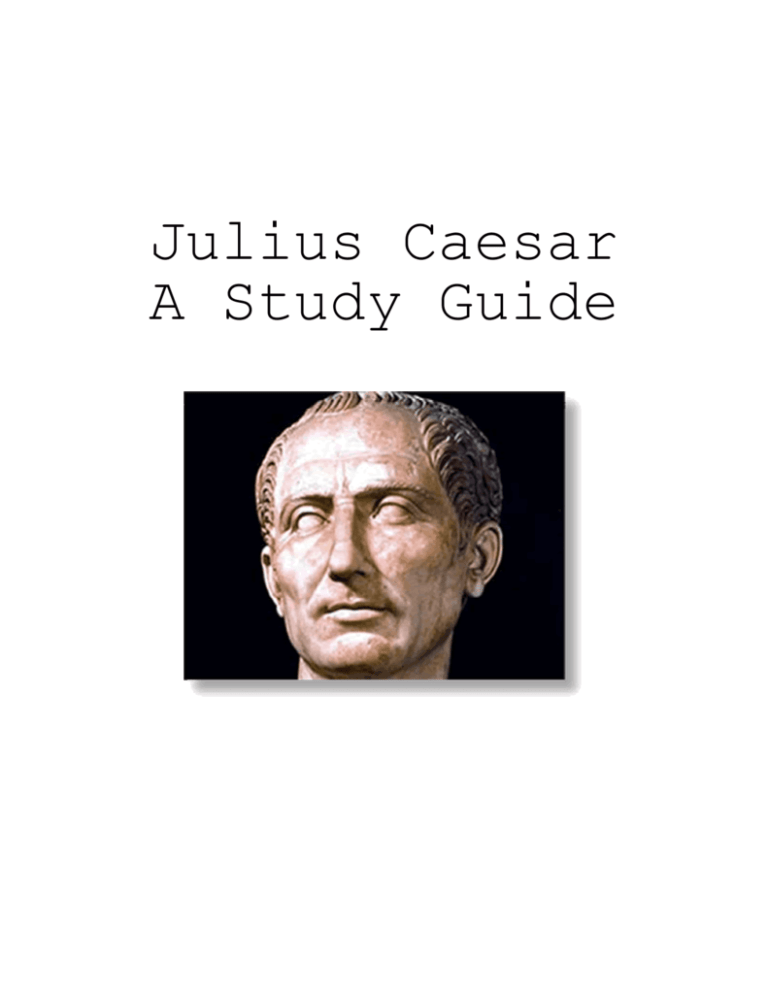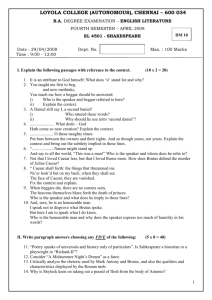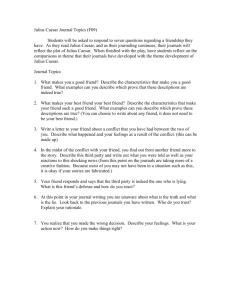Julius Caesar
advertisement

Julius Caesar A Study Guide PREWRITE In the space provided write what each of these words means to you. POWER DICTATORSHIP DEMOCRACY FREEDOM SAFTEY GLORY THEMES Fate vs Free Will Public vs Private Self Inflexibility vs Compromise Power DISCUSSION / ESSAY TOPICS 1. Discuss the attention paid (or not paid) to omens, nightmares, and other supernatural events. What do the various responses to these phenomena show about the struggle between fate and free will in Julius Caesar? Can the play's tragedies be attributed to the characters' failure to read the omens properly, or do the omens merely presage the inevitable? 2. Think about Caesar the mortal man as opposed to Caesar the public figure. How does he continue to wield power over events even after he is dead? Do the conspirators succeed in their goals by killing him, or is Caesar's influence too powerful to be contained even by his death? 3. How might Caesar be the role model for dictators that followed like Hitler, Stalin, Mussolini and Hussein? 4. Though Julius Caesar focuses on the struggles between powerful men, what role do the plebeians, or common people, play? Are they as fickle as claimed in the opening scene? How important is their support to the successes of the various military leaders and the outcome of the play? The play depicts Rome at a time of transition between republic and empire — a time in which, theoretically, the Roman people are losing their power. What role do the people themselves play in this transition? How is this similar to modern day governments and governmental issues? 5. Who is the protagonist in this play? Is it Caesar, who dies well before the end but whose power and name continue on? Or is it Brutus, the noble man who falls because of his tragic flaws? Before Reading the Play Politics, Patriotism, and Protest Opinionnaire From the NCTE Online Discussion Group 1. In light of the 2000 presidential election controversy, have the students mark “ A gree ” or “ Disagree ” for each of the following statements, before reading the play. a. It is never right to kill another person. b. Political leaders usually act in the best interests of their countries. c. If a political leader has done something wrong, it is acceptable to get rid of him or her by whatever means necessary. d. Power corrupts, and absolute power corrupts absolutely. e. In certain situations it may be justified for a political leader to bend or break the law for the good of the country. f. People should never compromise their ideals or beliefs. g. My country right or wrong is not just a slogan; it is every citizen’s patriotic duty. h. No cause, political or otherwise, is worth dying for. i. Cowards die many times before their deaths; the valiant taste of death but once. j. The evil that men do lives after them; the good is [often buried] with their bones. After Reading the Play Politics, Patriotism, and Protest Opinionnaire From the NCTE Online Discussion Group 1. In light of the 2000 presidential election controversy, have the students mark “ A gree ” or “ Disagree ” for each of the following statements, before reading the play. a. It is never right to kill another person. b. Political leaders usually act in the best interests of their countries. c. If a political leader has done something wrong, it is acceptable to get rid of him or her by whatever means necessary. d. Power corrupts, and absolute power corrupts absolutely. e. In certain situations it may be justified for a political leader to bend or break the law for the good of the country. f. People should never compromise their ideals or beliefs. g. My country right or wrong is not just a slogan; it is every citizen’s patriotic duty. h. No cause, political or otherwise, is worth dying for. i. Cowards die many times before their deaths; the valiant taste of death but once. j. The evil that men do lives after them; the good is [often buried] with their bones. Characters Prepare a map of all the characters and how they link together. CHARACTERS Julius Caesar: Casca: Calpurnia: Marcus Antonius (Mark Anthony): Marcus Brutus: Cassius: Octavius Caesar:







